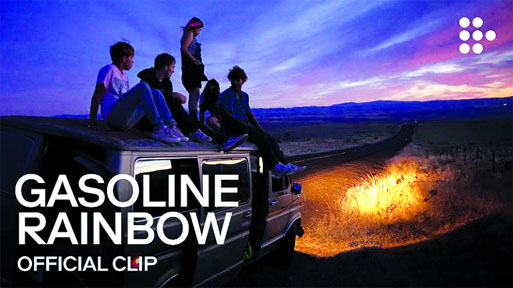In sibling directors Bill and Turner Ross ’ latest, “Gasoline Rainbow,” five Oregon teens just out of high school make their meandering way some 500 miles to reach the coast for what’s been billed as the “End of the World” party.
They are like countless young protagonists before them: on the road to find out. But while they share much of the same yearnings and anxieties of American road travelers from “On the Road” to “Easy Rider,” the circumstances of their particular coming of age are uniquely theirs — and what’s on the radio dial is, too. “Dude, I want to listen to some Shakira, bro,” one says from the backseat of their van.
This being the Ross brothers — the makers of the Texas-Mexico border portrait “Western” and “Bloody Nose, Empty Pockets,” in which they brought 22 people to a Las Vegas dive bar and asked them to act as though it was closing the next day — we are in a hybrid film world, part documentary, part fiction. Our characters — Micah, Nathaly, Nichole, Tony, Makai — are nonprofessional actors and their journey is a loosely constructed series of encounters that mostly unfold naturally.
It’s a filmmaking approach that can, in its weaker moments, result in the worst of both worlds: the rambling narrative of documentary and the manufactured quality of fiction. But on the whole, the Ross brothers’ observational, immersive filmmaking gets close to something bracingly real.
In the case of “Gasoline Rainbow,” which opens in theaters Friday, much is expressed by the land the teens traverse. Whether by car or on foot, their travels take them under highway overpasses, through sprawling train yards and along long rows of wind turbines. Global warming is mentioned only once, but it hovers over their uncertain future. They make their way across baren, dry lands and industrial blight. The name of that party is no coincidence. Source: HT
A radiant teenage road trip in ‘Gasoline Rainbow’
